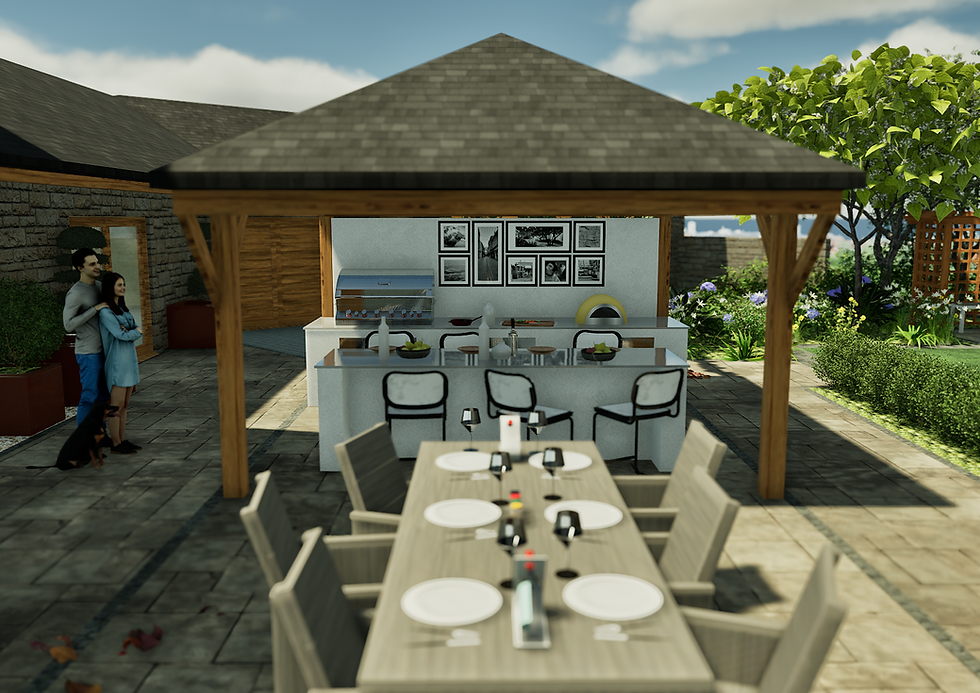Pros and Cons of Incorporating a Fish Pond into Your Garden Design
- MP Landscape Design

- Sep 15, 2025
- 3 min read
Updated: Oct 14, 2025
Creating a peaceful and beautiful garden often involves thoughtful design choices that enhance both appearance and functionality. One feature that captivates garden enthusiasts is the fish pond. A fish pond adds charm and tranquility to your outdoor area. However, it also brings some challenges. In this post, we will explore the pros and cons of incorporating a fish pond into your garden design, helping you make an informed choice.
The Benefits of Having a Fish Pond
Aesthetic Appeal
A fish pond can significantly enhance the beauty of your garden. Imagine a well-designed pond serving as a focal point, its shimmering water reflecting the sunlight. You could plant vibrant water lilies or install a small waterfall, creating a picturesque setting.
Wildlife Habitat
Beyond aesthetic value, a fish pond creates a thriving habitat for wildlife. Frogs, dragonflies, and various bird species often visit, enhancing the vibrancy of your garden. According to a report by the National Wildlife Federation, gardens that support local wildlife contribute to healthier ecosystems. By fostering biodiversity, you provide educational opportunities for children and adults alike, encouraging a deeper appreciation for nature.
Stress Relief
Spending time near water can significantly reduce stress. The sound of flowing water and the sight of fish swimming creates a calming atmosphere. Studies suggest that being near water can lower blood pressure and promote relaxation. Just a few minutes by your pond could help clear your mind after a busy day.
Educational Opportunities
A fish pond offers excellent educational experiences for families. Children can learn firsthand about aquatic ecosystems and the life cycles of fish. For instance, observing how goldfish reproduce or how frogs develop from tadpoles can foster a love for science and nature. Such hands-on learning experiences can be invaluable and foster conversation and curiosity.
The Drawbacks of Having a Fish Pond
Maintenance Requirements
While beautiful, keeping a fish pond requires consistent maintenance. You'll need to monitor water quality, clean the pond regularly, and ensure the fish stay healthy. For example, checking pH levels, which should ideally be between 6.5 and 7.5, can be crucial for fish health. Depending on the pond's size, this upkeep can be time-consuming and may require extra knowledge, especially about water conditions.

Cost Considerations
Building and maintaining a fish pond can be expensive. Initial costs may include excavation, installing a pond liner, filtration systems, and purchasing fish and plants. Ongoing expenses, like water treatments and equipment repairs, can accumulate quickly. Budgeting for these costs is essential to avoid surprises.
Potential for Mosquito Breeding
Stagnant water can become a breeding ground for mosquitoes, a nuisance in outdoor settings. While you can combat this issue by aerating the pond or introducing fish that eat mosquito larvae, it remains a significant consideration. According to the Centers for Disease Control and Prevention (CDC), up to 30 species of mosquitoes can breed in water features, which can deter outdoor enjoyment if not managed.
Seasonal Challenges
Depending on your local climate, a fish pond may present seasonal challenges. In regions with cold winters, you may need heaters or aerators to keep the water from freezing, ensuring the fish survive. Conversely, in warmer climates, monitoring water temperature and quality is vital to prevent overheating. Understanding these seasonal needs is crucial for a successful pond.
Space Limitations
Not every garden has the space for a fish pond. If your garden is small, dedicating space for a pond might mean sacrificing other garden elements. Prior to committing to a pond, evaluate your overall layout to ensure the pond can fit harmoniously within your outdoor space.
Weighing Your Options
Incorporating a fish pond into your garden design can provide many benefits, from beauty to educational opportunities. However, it is crucial to weigh these advantages against potential challenges, such as maintenance requirements and costs. By carefully considering your garden's layout, budget, and willingness to commit to ongoing care, you can make a well-informed choice about whether a fish pond is the right fit for your outdoor space.
Ultimately, a fish pond can be a stunning and rewarding addition to your garden, creating a peaceful retreat and a habitat for wildlife. With a clear understanding of both the pros and cons, you can ensure your garden remains a source of joy and relaxation for years to come.
Pros and Cons of Incorporating a Fish Pond into Your Garden Design















